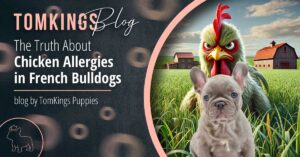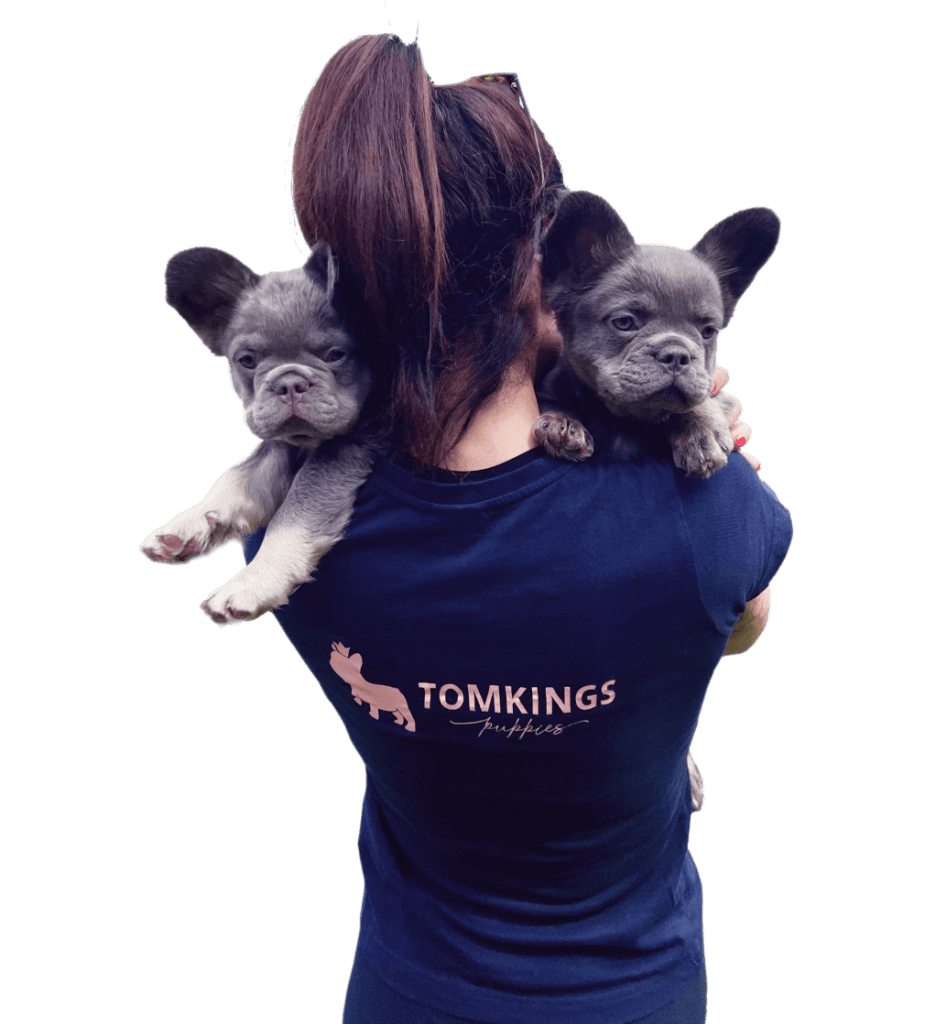Finding the best food for your French Bulldog can be tricky. There are hundreds of different options on the market all claiming to be the best, no wonder our Frenchie parents constantly turn to us asking what they should feed their puppies. This is why we gathered all our knowledge and shared the most important things to consider when selecting your puppy’s food. We will also answer some frequently asked questions about feeding so you’ll have no problem choosing the best dog food for your Frenchie by the end of the article!
Table of Contents
ToggleThe usual nutritional needs of French Bulldog
A well-balanced Frenchie diet should contain the correct amounts of macronutrients: water, proteins, fats, carbohydrates, minerals, and vitamins. The necessary amounts may vary based on your dog’s life stage, which means a puppy has different needs than a senior or pregnant dog.


Adult French Bulldogs require 25-30 calories per pound of body weight (or approximately 60 cal/kg). However, this is only a general guideline, and a more accurate calculation can be made based on specific factors. For instance, the age and activity level of your dog are essential factors to consider. Older and less active dogs require 30% less energy than young and energetic ones.
Additionally, being neutered also affects a dog’s food requirements. Hormonal changes can cause neutered dogs to become less active than their fertile counterparts. In such cases, it is recommended to decrease your dog’s food amount by 30%.
Store-bought vs. homemade food: which is better?
Most commercial dog foods and canned goods contain preservatives, flavor enhancers, coloring, and other additives. Instead of real meat, they often contain animal by-products or meat meal, which can cause allergic reactions in some dogs.


COOKBOOK FOR
FRENCHIES
When you cook food for your dogs, you can be sure of what goes into their bowl. Freshly cooked food retains real nutrients and vitamins that ensure a dog’s lifelong vitality, beautiful healthy skin and coat, and the elimination of diseases and allergic symptoms. Finally, homemade meals can prolong the average French Bulldog lifespan, so we definitely recommend homemade food!
Why is it so hard to find the right dog food?
Feeding is an evergreen topic among Frenchie parents in our Facebook group. They know they should feed their puppy with high-quality premium dog food to keep their baby healthy and fit, but they are left puzzled when they see the plethora of different choices. If you’re a Frenchie owner yourself, this probably sounds familiar. After hours of researching and picking other people’s brains, you finally settle for a dog food that seems to be perfect for your Frenchie, but still, your baby ends up either refusing it or having diarrhea and skin issues.


Why is it so hard to find the right food? The answer is actually quite simple: every Frenchie is different and what works for one puppy may unfortunately cause problems for the other. It usually takes a lot of experimenting and changing the food on multiple occasions until you find what works best for your Frenchie’s digestive system. The best French Bulldog breeders will always give you advice on how to continue feeding your puppy once you welcome them home.
So what are the most important things to consider while trying to find the perfect food for your Frenchie? Read on to find out!
7 tips to find the best food for your French Bulldog
1. The ingredients of the dog food
When looking to find the best food for your Frenchie, the first thing you’ll want to do is to check the list of ingredients. The quality of dog food is always determined by the percentage of its protein content, in other words, the amount of meat or fish it contains. The higher the meat/fish content of the food, the higher its quality and the price usually increases in direct proportion to that.
So what should you pay attention to when looking at the ingredients list? In the first place, you’ll always find the ingredient which the particular food contains the most, so it’s crucial that there is a clearly stated fresh or raw meat/fish there. This could be beef, lamb, salmon, or any other type of meat. If you see a food that doesn’t specify the meat and uses labels like animal protein don’t buy it!
After the fresh meat may come some dehydrated or dried meat/fish, then eggs, organ meats, and entrails, legume protein sources (peas, lentils, chickpeas, beans, etc.). The list usually ends with some sort of animal fat, vegetables, and fruits.


Any other ingredient not mentioned above is only included to increase the volume of the dog food and to ensure the most economical production possible. So, if you see that a food contains an unrealistic amount of filler ingredients like wheat, corn, or chemical preservatives, it is definitely not a suitable and healthy choice for your Frenchie.
2. Dog foods without chicken and grains
A question that always comes up when choosing the right food for a Frenchie is whether it has to be chicken or grain-free. Generally speaking, French Bulldogs belong to the group of sensitive dog breeds who tend to have allergic reactions to chicken and/or grains like wheat, corn, and sorghum. For that reason, we usually recommend giving chicken and grain-free food right from the start to avoid any possible problems.


Ultimate Guide
to Raising a Frenchie
This tendency of course doesn’t mean that a chicken-based food will certainly cause issues for your Frenchie, but if you notice any allergic symptoms, the first thing you should think of is the chicken: eliminating it usually solves the problem right away. Many people don’t know that dogs actually don’t need grains in their diet whatsoever yet many premium dog foods do contain them. Our recommendation is to avoid these foods, your Frenchie’s skin will thank you.
3. The price of the dog food
When looking for food for your Frenchie, the price will definitely be a factor that you’ll consider. If you think that the more expensive the food the better it is, you’re not far from the truth. Still, it happens way too often that well-known dog food companies charge more for foods with poor quality and nutritional values than less-known companies for much better quality.


That means that if you look at the list of ingredients, you can find companies whose food meets all the criteria we mentioned above and is much more affordable. Like with so many things, the name is not everything! Just because you’ve heard a lot about dog food from commercials it doesn’t necessarily mean it’s good for your Frenchie.
4. The size of the kibble
French Bulldogs belong to smaller dog breeds, so it’s highly recommended that you choose a food specifically designed for small or medium-sized dogs. That way you won’t have to worry about the size of the kibble. Neither too small nor too large kibble size is ideal: if it’s too small your Frenchie will just inhale it without chewing it properly, which may even cause choking! On the other hand, if the kibble is too large they will have difficulties consuming the food.
5. The flavor of the dog food
When looking at dog foods, you can choose from lots of different flavors like a lamb, fish, beef, duck, etc. If one of the foods from a particular brand works fine for your Frenchie, the flavors can and should be changed as long as they have the same nutritional values. A varied diet is important not only for humans but dogs as well, not to mention that your fur baby will be very happy to taste some new flavors. So, if you notice a greater appetite in your pup when introducing a new flavor don’t be surprised!
6. The stool of your Frenchie
A very important criterion and perhaps the best indicator of the given food is suitable for your Frenchie is their stool. A healthy stool should always be completely solid, which means you can easily collect it with a bag. A loose stool probably doesn’t require much explaining but too hard may be trickier: you will see your Frenchie straining and taking longer to defecate.


So, if you notice that your puppy’s stool is either too hard or too loose all the time, that means that you should change their food immediately. You should always ensure a smooth transition by gradually mixing in more and more of the new food with the old to avoid any dietary issues.
7. Signs of a food allergy in your Frenchie
We have already mentioned that Frenchies tend to be allergic to chicken, but what are the actual signs of a food allergy? The most common symptoms include scratching, hair loss, dull lifeless fur, inflamed eyes and ears often with some discharge, paw licking, swelling, but also vomiting, and loose stools. You may not notice all of these and the degree to which they occur may also vary. Any of these symptoms indicate that an immediate change of diet is necessary, about which you should always consult your vet first.
+1 How much and how many times
The general rule of thumb is to feed your Frenchie 3 times a day until the age of 5 months old and after that switch to 2 times in the morning in the evening. This is only a suggestion of course: as you’re the one who sees your puppy daily it will be your task to decide when it’s time to make the switch and also what amount works best.
Eating a bit more slowly and with less appetite are usually signs telling you to cut out the middle meal. As for the amount, nice-looking French Bulldogs are a bit stockier, so you should always increase and lower the amount of their food with that in mind. Read our article to learn more about maintaining a healthy body weight for your Frenchie.


Special recommendations by TomKings Puppies
The best food for French Bulldog with a sensitive stomach
For dogs with sensitive stomachs, we always recommend home-cooked food, so you can be sure of what your dog is eating. However, it is important to ensure that the transition from store-bought to home-cooked dog food is gradual. Here is our basic guideline that you can follow during the transition:
Days 1-3: ¼ home cooked + ¾ store-bought
Days 4-6: ½ home cooked + ½ store-bought
Day 7-10: ¾ home cooked + ¼ store-bought
The best wet food for Frenchies
When choosing wet food for French Bulldogs, it is important to consider the dog’s individual nutritional needs, age, activity level, and any health concerns or allergies. Consultation with a veterinarian can also be helpful in determining the best wet food for a French Bulldog. It is essential to choose a high-quality brand that uses real meat and avoids fillers, artificial preservatives, and additives. Look for products that are labeled as complete and balanced, which means they contain all the essential nutrients your French Bulldog needs in the right proportions.
The best dry food for French Bulldogs
Although cheaper dry food may appear to be similar to premium brands based on the label, there are significant differences in the quantity and quality of the ingredients. Cheaper brands may contain carcinogenic ingredients, which can be harmful to your puppy’s health.


To ensure the health and well-being of your Frenchie, it is recommended to purchase premium brands such as Hill’s, Acana, or Orijen. Additionally, we advise you to switch to adult food at the age of 6-8 months. We always inform new parents of Tomkings puppies of the brands we used to feed the pups and we recommend to continue using the same brand for some time.
The best raw food for Frenchies
There are several types of raw food diets for dogs, including the Prey Model Diet, the B.A.R.F. Diet, the Homemade Raw Diet and the Commercial Raw Diet. To ensure that TomKings puppies receive only the highest quality food, we continuously evaluate available options and test the latest trends. We consult with a panel of experts and experienced puppy parents within the TomKings Frenchie Family, and we are proud to recommend the B.A.R.F. (Biologically Appropriate Raw Foods) diet.
Best food for overweight Frenchies
When it comes to overweight French Bulldogs, it is essential to choose a diet that is low in calories and fat while still providing all the necessary nutrients for your dog’s health. Consulting with a veterinarian is also recommended to determine the best course of action.
In general, weight management dog foods can be a good option for overweight French Bulldogs. These foods are formulated to be lower in calories and fat while still providing high-quality protein and other essential nutrients. Look for products that are labeled as “weight management,” “low calorie,” or “light” to ensure that the food is appropriate for your French Bulldog’s needs.


It is also important to monitor your dog’s calorie intake and portion sizes carefully. Avoid feeding table scraps or high-calorie treats, and make sure to provide plenty of opportunities for exercise and play. In some cases, a prescription diet recommended by a veterinarian may be necessary to help your French Bulldog achieve and maintain a healthy weight.
Best food for French Bulldogs with skin allergies
If your French Bulldog has skin allergies, it is important to choose a diet that is specially formulated to help support skin health and minimize potential allergens. Consultation with a veterinarian is also recommended to determine the best course of action.
Some high-quality dog food brands offer special formulas that are designed for dogs with skin allergies. These foods typically contain limited ingredients and exclude common allergens such as wheat, soy, chicken, and dairy products. Instead, they may use alternative protein sources such as fish or venison and may contain added omega-3 and omega-6 fatty acids to help support skin health.
Some veterinarians may also recommend prescription diets that are formulated specifically to manage skin allergies in dogs. These diets may contain hydrolyzed proteins, which have been broken down into smaller components to minimize the risk of an allergic reaction.
You can also try cooking homemade dog food recipes to control what gets into your pup’s bowl.
FAQs
Even though processed dog foods might not look healthy to us, they actually contain all the nutrients that Frenchies need to stay healthy. Home-made and raw diets like B.A.R.F. are of course considered to be healthier alternatives but you should always do your research beforehand to make sure your Frenchie gets all the necessary nutrients.
That’s up to you to decide, but in our experience, you will be better off with dry dog food as it’s easier to store and is more affordable. Wet foods are of course more appealing to dogs, which means they get used to them easily and will not want to eat dry food again. If your Frenchie is a picky eater you can mix the dry and wet food but never give them the latter only. We recommend wet food for dogs who are ill and have no appetite.
The most common symptoms of a food allergy include scratching, hair loss, dull/lifeless fur, inflamed eyes and ears often with some discharge, paw licking, swelling, vomiting, and loose stools. If any of these occur, you should change your Frenchie’s food.
The most common symptoms of a food allergy include scratching, hair loss, dull/lifeless fur, inflamed eyes and ears often with some discharge, paw licking, swelling, vomiting, and loose stools. If any of these occur, you should change your Frenchie’s food.
We usually recommend switching to adult food at the age of 8-12 months old. If you notice that your puppy looks a bit chubbier or bigger compared to other Frenchies you can make this change even sooner.
The best choice for your Frenchie puppy is to continue providing the same brand the breeder used to provide. This should be a high-quality brand that uses real meat and avoids fillers, artificial preservatives, and additives.
You have several options. You can buy high-quality wet and dry god food at your local pet store or if you want more control over what goes into the bowl, you can feed your adult Frenchie with home-cooked food. Raw diets like B.A.R.F. are also great options.
The article is based on the expert knowledge of the TomKings Puppies team who have been breeding French Bulldogs for 10 years on their farm. All the pictures in the post belong to them and their customers, and show puppies from their breed. Check their available French Bulldog puppies, or if you have any questions or comments let us know below the article.



















